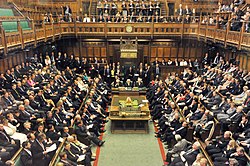It’s fair to say that UK politics has a lot of problems right now, and those who know me probably know that I believe many of those issues surround the Conservative party. But what is the most important issue in UK politics right now?

The Conservatives
Going straight to the meat of my argument, my view is that the Conservative Party is a symptom, not the cause, of our biggest problem.
Now, before you think this is me excusing their behaviour, I am absolutely not. What they have done to the country is reprehensible, collapsing the NHS, increasing inequality, putting us on the brink of recession through mad tax cutting schemes, and that’s only three issues off the top of my head. They have proved time and time again that they are unsuitable for leadership, yet our system allows them to lead as though the majority of the country wants them.
We don’t
So why do they currently have a majority?
Our Broken System
How is our system broken, and how is this the most important issue in UK politics?
To answer that we have to go back to the system we have of electing representatives. We call that “First Past The Post” (FPTP), which is a callback to the original racing origins of the term. In other words, for a given vote under the FPTP, the person who gets the most votes wins.
Conceptually this works, especially where there are only two candidates in a race, but the problems start to become apparent when you extend this to more than two candidates and more than one constituency.
More Than Two Candidates
Let’s look at a theoretical constituency with three strong candidates, Alice, Bob and Connie. Let’s take the most absurd example, when each of them gets exactly one third of the vote (assuming the constituency is 70,000 people, that means each gets around 23,333 votes). What happens now?
Well, if we assume they have genuinely equal shares of the votes, the winner is selected by a game of chance. For two candidates this means tossing a coin to see who wins, for three presumably it would involve rolling a die or drawing lots.
If Alice wins, the aftermath of this is that voters for both Bob and Connie will have voted in an exactly symmetrical manner to Alice’s voters, but their candidates will have lost. They will have no representation of their views in Parliament.
Clearly this example is vanishingly unlikely, but let’s look at a slightly more likely outcome. In this case, Alice gets 25,000 votes, Bob gets 20,000 and Connie gets 15,000. What happens now?
At the face of it, it’s clear that Alice should win, but what does this mean for the constituency as a whole? If Bob and Connie have very similar manifestos that differ on only a few small but important issues, then their combined vote share would be 35,000, far more than Alice received. But Alice would be declared the winner, and only her political views would be represented in Parliament.
This gets even worse when we consider more than one constituency.
More Than One Constituency
Let’s introduce a different constituency alongside the one above, this one with candidates Andrew, Bridget and Connor. Respectively they are from the same parties as Alice, Bob and Connie. In this constituency, Bridget wins comfortable, taking 30,000 votes to Connor’s 20,000 and Andrew’s 10,000. Importantly, the two constituencies have case the same number of total votes as follows:
| Candidate/Constituency | A | B | C | Total |
|---|---|---|---|---|
| 1 | 25,000 | 20,000 | 15,000 | 60,000 |
| 2 | 10,000 | 30,000 | 20,000 | 60,000 |
| Combined | 35,000 | 50,000 | 35,000 | 120,000 |
Hopefully the issues start to become really clear here. If we assume that the system is set up so that each constituency returns one MP, then parties A and B each get one MP. However, the problems arise when you start to look at the total number of votes across both constituencies.
In this example, B is the clear winner with 50,000 total votes compared to 35,000 each for the runners up. B only gets one MP though, the same as A. C gets no MPs despite doing exactly as well as A across the constituencies. In essence, anyone voting for C loses their representation not because their choice was unpopular but because of a quirk in the distribution of votes.
This effect gets worse when you start looking across the whole country. In the case of the UK as a whole, we have 650 constituencies up for grabs, and in 2019 our general election results were as follows:
| Party | Conservatives | Labour | SNP | Liberal Democrats | Greens |
|---|---|---|---|---|---|
| Vote Proportion | 43.6% | 32.1% | 3.9% | 11.6% | 2.6% |
| Seat Proportion | 56.2% | 31.1% | 7.4% | 1.7% | 0.2% |
| Difference | 12.6% | -1.0% | 3.5% | -9.9% | -2.4% |
| Net benefit or loss | Benefit | Loss | Benefit | Loss | Loss |
It is fairly hard to argue that the last few years have been anything other than an abject disaster from a governance position, and it is likewise very clear that the claims of an overwhelming majority are ludicrous at best. There is no universe in which a 43.6% vote share could be considered a majority, and yet that is precisely what the current system allows for.
Our system is designed to put the least objectionable party into total power at any time, and this system is broken. It directly leads to adversarial politics and the desire to immediately undo the key policies of the previous government upon taking office. This means that key aspects of society such as the NHS or Education become political footballs rather than something politicians work to develop for the whole country.
What Can We Do Better?
At outset it might feel like changing politics is a huge undertaking, and in many respects it is. But there is a simple solution which will have a multitude of benefits, namely a change to proportional representation.
There are a number of nuances to this approach to elections, but the simple summary is that under any system of proportional representation, seats are awarded to parties in accordance with their actual share of the votes. In the 2019 General Election, for example, the Conservatives would have 43.6% of the seats rather than 56.2%. They would still be the largest party in parliament, but they would not command a majority and could not therefore simply push through any legislation they wanted.
This would have a few knock-on effects:
- We would likely see an end to majority governments being considered normal.
- Because we would have more “hung parliaments”, we would expect more parties to need to work collaboratively rather than adversarially. That means that plans would need to be made to appeal to a wide range of representatives rather than just being driven by a single party.
- Vote power would be equalised across all seats, so every person’s vote would be worth the same.
- There would be an end to “safe seats”, as every MP would be required to campaign to stay in office.
The change to collaborative working would have a huge benefit to longevity of government plans. At the moment, the plans for the NHS or Education (or any other department for that matter) are artificially kept short because the government has no certainty that they will still be involved in decision-making in five or ten years. Under this system, even if present as a minority, they would still have a say over the changing plans for the various departments rather than being nothing more than an interested onlooker.
